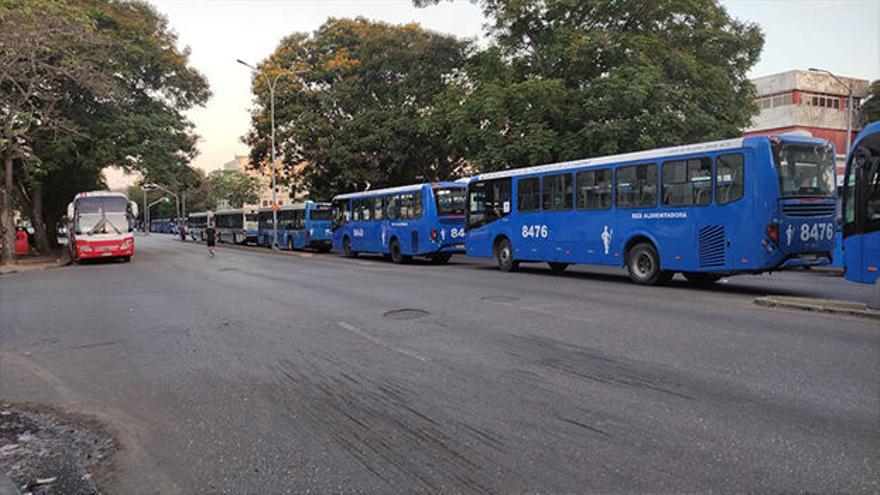
![]() 14ymedio, Havana, April 22, 2023 — The fuel shortage that overwhelms thousands of Cuban families will not stop the Government, which has already announced that there will be a parade on May 1. “We will find a way to celebrate it,” Miguel Díaz-Canel promised this Friday on a visit to the province of Villa Clara.
14ymedio, Havana, April 22, 2023 — The fuel shortage that overwhelms thousands of Cuban families will not stop the Government, which has already announced that there will be a parade on May 1. “We will find a way to celebrate it,” Miguel Díaz-Canel promised this Friday on a visit to the province of Villa Clara.
The Communist Party newspaper did not offer details about how the president intends to carry out his own “direction.” No one seems to be too clear about the script on one of the key dates for the regime’s propaganda, in which thousands of workers are forced to march as a sign of adherence to the Government and a reaffirmation of the system.
Díaz-Canel insisted that he was “aware of the economic situation” but said that it would not prevent the achievement of the objectives of the parade: the condemnation of the “insurgent blockade” and support for the Revolution. “Do not have any doubt that we will fill our plazas,” was his conclusion.
What worries the population the most are the undeclared expenses that, behind the curtain, will make it possible for the re-designated president to live up to his “promise.” In 2022, after two years of confinement due to the pandemic, the authorities devoted a large budget to the “recovery” of the parade. Security personnel, banners and propaganda, platforms and the mobilization of thousands of state workers cost the regime an arm and a leg, but this year they want to revisit the event.
The announcement has stunned those who expected a more austere May 1, and also Cuban families, overwhelmed by a crisis in the fuel supply that will embitter the summer months not only with the paralysis of the country but with long blackouts.
However, the Government cannot afford to suspend one of its main showcases in front of those who, despite the regime’s bad reputation in terms of business, persist in a dialogue with Havana. A block of 400 Spanish professionals, associated with the Basque company DIT Gestión, has announced with great fanfare that it will parade alongside the Cubans. Of course, after the march they will enjoy a tourist convention on the northern keys of Villa Clara, for which the authorities have offered “all kinds of facilities,” including transportation.
The images of desolate streets, reminiscent of the hardest months of the pandemic, without cars or people, have been common in the last two weeks. The Government has gone so far as to blame the fuel supplier countries — especially Venezuela and Russia — for not complying with the contracts for the delivery of crude oil and its derivatives, and denies that the crisis is due to “inefficiencies of the country” or problems of the energy institutions.
Although the authorities and the official press have not notified the arrival of new shipments of fuel, the maritime application Vesselfinder recorded that between April 15 and 21, three ships with oil arrived at Cuban ports. The latest is the BT Bicentennial of Mexican origin, and the Zheng He 1, which sails with the flag of Liberia and the Panamanian Caribbean Alliance, which also docked shortly before.
The arrival of these ships has not resulted in energy relief. The service stations are still short of fuel, and rationing measures remain in force, which suggests that the Government is reserving the imported fuel to mobilize those who attend the parade. The suspicion that the transport of May 1 is being paid for with the immobilization and blackouts of these weeks, has provoked a barrage of criticism of the regime on the internet.
“Oh, people of Cuba, how much more you deserve! Even the mockery of the official press. I hope to see you on May 1, firmly supporting this immense Revolution and party that gives you so much every day,” user William Fuentes responded with irony to a Cubadebate publication that carelessly commented on the long lines of cars at gas stations.
The official newspaper published a “comical” article about how “good humor” is maintained among people who play and even cook to pass the time while they wait on Zapata Street, in El Vedado, Havana. “Once again, the ruling press mocks the people,” concluded another user, identified as Osmar Domínguez.
Translated by Regina Anavy
COLLABORATE WITH OUR WORK: The 14ymedio team is committed to practicing serious journalism that reflects Cuba’s reality in all its depth. Thank you for joining us on this long journey. We invite you to continue supporting us by becoming a member of 14ymedio now. Together we can continue transforming journalism in Cuba.
